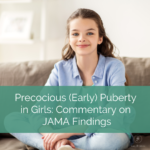
Precocious (Early) Puberty in Girls
June 6, 2024
Diagnosis with Menstrual Blood: Future Women’s Health Initiatives
June 28, 2024Theology of the Body: It's not about sex
I've been encountering some interesting exchanges online recently-- specifically in Catholic groups about NFP.
There are some misconceptions I've been noticing about JPII's "Theology of the Body" which are not exactly new, but are becoming a lot more pervasive. So this week, I thought I'd set the record straight for everyone here:
Theology of the Body is not about sex.
I feel this needs to be said, because more and more often, I see people asking about 'Theology of the Body' as if it were some sort of juridical Church treatise about what couples can do in the bedroom.
"What does TOB have to say about xyz sexual act?"
"What does TOB have to say about couples discerning to postpone pregnancy for xyz medical condition?"
It seems to me that "TOB" is now being taken as some sort of shorthand for an imaginary codified compendium of "What the Church teaches about sex." I can understand why people might think this way, because some popular TOB proponents and teachers tend to focus very heavily on the implications of JPII's "Theology of the Body" within the context of sexual ethics.
But... I think that emphasis is misplaced.
So in case your perception of TOB tends towards merely understanding it as relating to sexual intercourse (or maybe a friend's perception, or some future person you encounter on the internet....), here are a few quick thoughts to consider!
What is "Theology of the Body?
What we call the "Theology of the Body" is actually a compilation of particular talks given by Pope St. John Paul II between 1970 and 1984. These talks were given in the context of regular Wednesday audiences, when the pope publicly addresses anyone gathered in St. Peter's Square. These audiences are usually instructive, offering papal commentary on a theological theme related to the reading chosen for that day. They don't usually focus on a single theme for more than maybe a few weeks at a time, but JPII was a really consistent guy. And he had some key themes that he returned to again and again and again-- not just in his papacy, but even in his philosophical work.
JPII liked to think and teach in a sort of "spiral" fashion, touching on one topic and expounding upon its relationship to other topics... then returning to the original idea at a deeper level and going back through all those related topics again at a deeper level, too. One of the many phrases you'll see repeated over and over again in this compilation of Wednesday audiences is, "Let us return to...."
As a scholastic, I tend to like things a bit more linear than the way JPII presents these talks. 😂 It was very confusing to begin reading JPII because sometimes it felt like he didn't really treat the topic in its entirety before moving on. And then I would realize that's because he was going to come back to it again and again, deeper and deeper, further up and further in.
This is what he did with those Wednesday audiences, which returned to many of the same themes again and again and again. So what were those themes? And if TOB isn't about sex, what is it about?
THEMES of TOB
If you wanted to sum up the core teaching of JPII's TOB in a simple way, you could say: "The human body is not just ornamental: it has meaning, given by God to express and make known BOTH spiritual and physical Truths."
One of the things the human body expresses and makes known is the communion to which man and woman are called. The fulfillment of the communion we are made for is union with God. But the communion of man and woman through marriage, expressed bodily in a unique way through sexual intercourse, serves to point us towards that union with God.
Another way to say all of this is that the body participates in what JPII calls the "dimension of sign," or.. "sacramentality."
So, our bodies are meant to point us in EVERYTHING to the spiritual reality of eternal life in heaven, but because our bodies are a necessary part of our human nature, through Christ's Incarnation and the subsequent Redemption of the world (brought to us regularly in the Sacramental life of the Church), our bodies also become bearers of that reality into the physical world.
Confusing enough?
Yeah, this is why a lot of people don't read TOB directly! JPII is not exactly a nightstand book companion.
But the absolute beauty of JPII is that these themes are woven through ALL of his work, not just his papal Wednesday audiences! So if you've struggled to read TOB directly, here are some key things to know about the major themes JPII puts in all of his writings:
- The Personalistic Norm- this is a philosophical principle which states that a person must never be used as a means to an end; people should always be loved.
- The Gift of Self- true human freedom and identity is encountered when a person makes a gift of himself or herself to the Other.
- Christ is the Revelation of Mankind to Itself- through the Incarnation, Christ shows us what it means to be human. It is only through following Christ that our own identity can be understood, both collectively and as individuals.
- Conscience- human conscience is not something which determines the morality of acts for an individual; conscience is a faculty of the mind which allows the person to discover and judge the morality of acts according to principles which it is able to discern from nature and from Revelation (thus, consciences must be formed)
- Complementarity of the Sexes- Man and Woman are created to show us different aspects of God's image. They most perfectly image God together, when joined in complementarity, which allows a fuller image of God to be displayed.
- Dignity of the Human Person- each person is created with inherent dignity because we are all made in the image of God. This dignity means we are created for free, authentic relationship in love. To violate that image is to denigrate both the human person and God.
- Faith and Reason- these two aspects of human thought and action are not contrary to one another. Both are meant to lift the human person up to contemplation of God-- reason primarily through the faculties of the mind, and faith through the assent of the human heart.
These are just a few regularly-occurring themes! And you can see how many of them are interconnected.
So if you read something like Salvifici doloris (JPII's encyclical on suffering) what you'll notice is that his exposition on the Good Samaritan is all about the Gift of Self. And Christ is the one who reveals to humans the meaning of their suffering. And Job's plight makes us consider the conscience discernible in the moral order of creation. Many of these themes are there.
But another thing you'll notice is that these themes are actually.... everywhere in our Catholic intellectual tradition. And everywhere in our Catholic devotions. And in our liturgy.
Because "Theology of the Body" may have been a very particular meditation on the meaning of the body given by a man who witnessed the barbaric destruction and denial of the dignity of human life during WWII. It was a prophetic message preached by a man who understood the great evils approaching our time-- evils which seek to destroy the meaning of family, marriage, sexuality, and gift.
But at its core, "Theology of the Body" is not something truly new. It was a wake up call to the people of the new millennium, who were falling into new expressions of the same old heresy which has ALWAYS been present to oppose the Church: the heresy promoted by Marcion and Mani and Zoraster and Albi and so many others-- DUALISM.
Dualism is the rejection of the body (and all physical matter) as evil, in opposition to the goodness of "pure spirit."
In our modern parlance, one might simply point towards the rejection of the body as having any sort of real meaning about the human person. Instead of focusing on the "spirit," many people will say that the mind is the "real person" and the body should therefore be shaped according to whatever the mind wants or thinks. There is little acknowledgment that the given body of a person communicates the reality of who that person is to others.
So... is TOB about sex? Kind of. Okay. It does talk about sex.
But TOB is really about people learning to receive the gift of our entire selves-- body and soul-- from God, and to be prepared to give that self as a total gift for others.
JPII begins this big project with what he feels is an obvious place: the union of Man and Woman and the dimension of sign they bring to the world through marriage. But he even states that with this understanding of the body, there are many more vast areas to be explored!
Oh- and if you want a resource to delve deeper, my undergrad thesis advisor just started a podcast where he plans to give commentary alongside JPII's text. It's not going to be a catchy, fast-paced Youtube format. Think about this project as a commitment to pull up a comfy armchair, a cup of tea, and listen to a very wise professor who has spent many years at the feet of JPII, drawing closer to Christ through this man's teaching.




